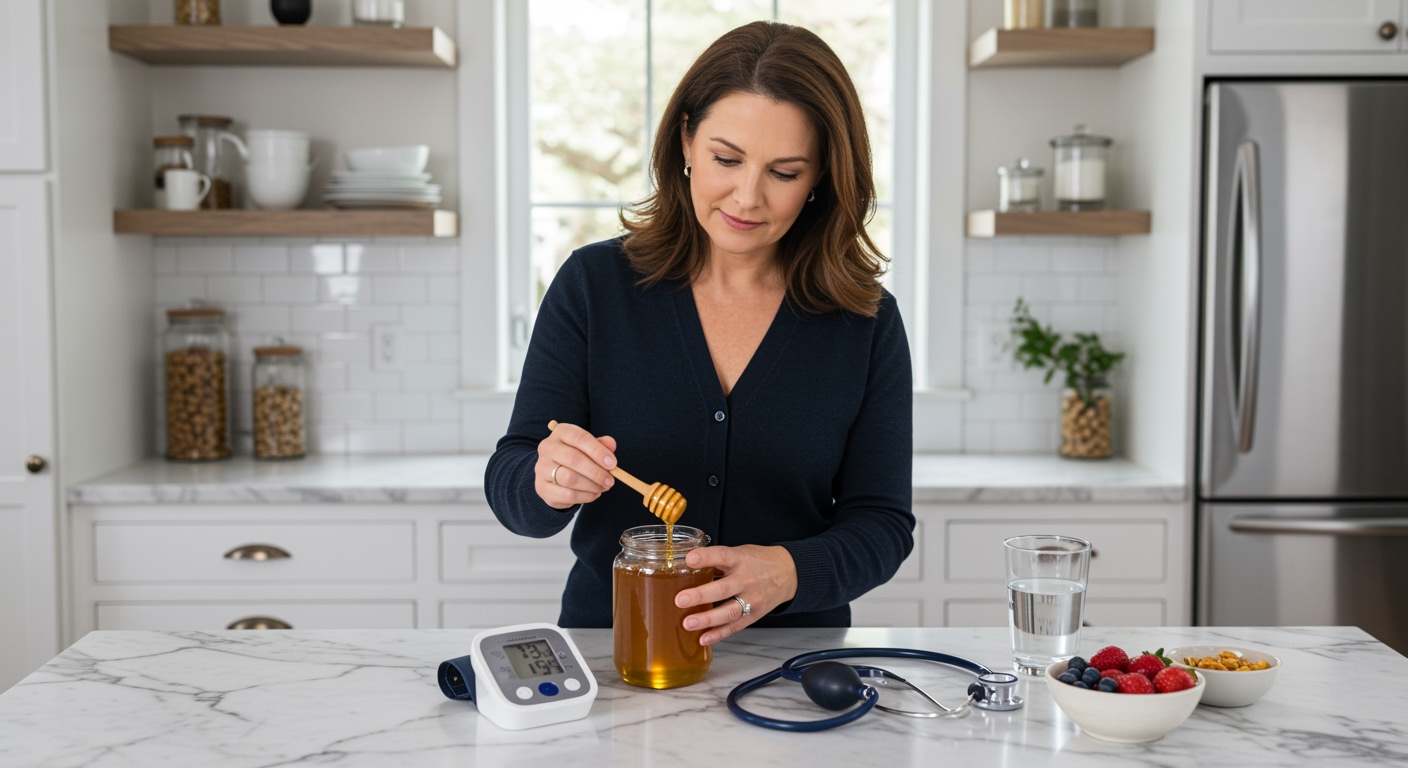✪ Key Takeaway: Honey is generally safe for low blood pressure but may cause temporary drops due to its natural sugars and vasodilating compounds.
Introduction
Your morning tea tastes better with honey, but you wonder if this golden sweetener affects your already low blood pressure.
Many people with hypotension worry about every food choice because they want to avoid anything that might make their condition worse.
Hi, I am Abdur, your nutrition coach and today I am going to explain how honey affects low blood pressure and whether you should include it in your daily diet.
How Does Honey Affect Blood Pressure?
Honey contains natural sugars that can cause temporary changes in your blood pressure through several mechanisms.
When you consume honey, your body quickly absorbs its fructose and glucose content into your bloodstream.
This rapid absorption triggers your pancreas to release insulin, which helps cells absorb the sugar for energy.
The insulin response can cause a temporary vasodilation effect, meaning your blood vessels relax and widen slightly.
This widening of blood vessels typically leads to a small decrease in blood pressure for about 30 to 60 minutes after consumption.
Honey also contains trace amounts of nitric oxide precursors, which are compounds that help your blood vessels maintain flexibility and proper function.
✪ Fact: Raw honey contains over 180 different compounds including enzymes, amino acids, and antioxidants that affect cardiovascular function.
What Makes Honey Different From Regular Sugar?
Unlike refined white sugar, honey provides additional compounds that may influence your cardiovascular system in unique ways.
Honey contains natural antioxidants like flavonoids and phenolic acids that help protect your blood vessels from oxidative stress.
These antioxidants support healthy blood vessel function by reducing inflammation and improving endothelial cell health.
The glycemic index of honey ranges from 35 to 58, which is lower than table sugar at 65.
This means honey causes a more gradual rise in blood sugar compared to refined sugar, leading to a gentler insulin response.
Honey also contains small amounts of minerals like potassium and magnesium that support healthy blood pressure regulation.
However, these mineral amounts are quite small and unlikely to significantly impact your blood pressure on their own.
✪ Pro Tip: Choose raw, unprocessed honey to get the maximum antioxidant benefits for your cardiovascular health.
Can Honey Worsen Low Blood Pressure Symptoms?
For most people with low blood pressure, honey consumption in moderate amounts does not cause problematic symptoms.
However, consuming large quantities of honey on an empty stomach might cause a more pronounced blood pressure drop.
This temporary decrease could potentially worsen symptoms like dizziness, lightheadedness, or fatigue in sensitive individuals.
The key factor is timing and quantity rather than avoiding honey completely.
Eating honey with other foods, especially those containing protein or healthy fats, helps slow sugar absorption and minimize blood pressure fluctuations.
People with severe hypotension should monitor their response to honey and consider consuming it with balanced meals rather than alone.
✪ Note: Start with small amounts of honey and observe how your body responds before increasing your intake.
What Is The Safe Amount Of Honey For Low Blood Pressure?
The American Heart Association recommends limiting added sugars to no more than 6 teaspoons daily for women and 9 teaspoons for men.
One tablespoon of honey contains about 3 teaspoons worth of natural sugars, so 1-2 tablespoons per day fits within healthy guidelines.
For people with low blood pressure, spreading this amount throughout the day rather than consuming it all at once provides better blood sugar stability.
Consider adding one teaspoon to your morning tea, another teaspoon to yogurt, and perhaps one more teaspoon in cooking.
This approach prevents large spikes in blood sugar and minimizes the risk of significant blood pressure fluctuations.
Always consume honey as part of balanced meals that include protein, healthy fats, and fiber to slow absorption.
✪ Pro Tip: Mix honey with nuts or seeds to create a more balanced snack that supports stable blood pressure.
When Should You Avoid Honey With Low Blood Pressure?
Certain situations require extra caution when consuming honey if you have low blood pressure.
Avoid honey on an empty stomach first thing in the morning, especially if you frequently experience morning dizziness or weakness.
Skip honey before physical exercise, as the combination of natural vasodilation from honey and exercise-induced blood vessel changes might cause excessive blood pressure drops.
Be cautious with honey if you take blood pressure medications, as the combination might enhance the medication effects.
People with diabetes and low blood pressure should monitor their blood sugar closely when adding honey to their diet.
If you experience increased dizziness, fatigue, or other hypotension symptoms after eating honey, consider reducing the amount or avoiding it temporarily.
✪ Note: Always consult your healthcare provider before making significant dietary changes if you have chronic low blood pressure.
The Bottom Line
Honey is generally safe for people with low blood pressure when consumed in moderate amounts as part of balanced meals.
Smart nutrition means understanding how foods affect your unique health conditions, not avoiding everything out of fear.
I would love to hear about your experience with honey and low blood pressure in the comments below, and please share any questions you might have about managing your diet with hypotension.
References
At NutritionCrown, we use quality and credible sources to ensure our content is accurate and trustworthy. Below are the sources referenced in creating this article:





